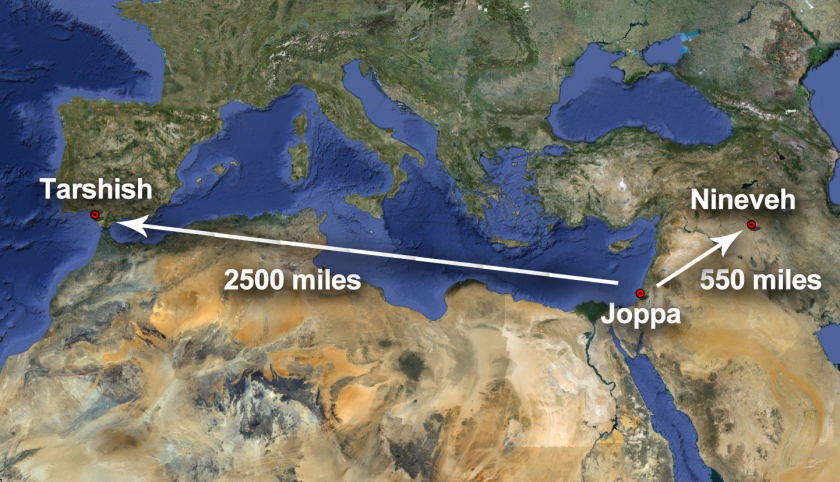Now the word of the LORD came to Jonah the son of Amittai, saying, “Arise, go to Nineveh, that great city, and call out against it, for their evil has come up before me.” But Jonah rose to flee to Tarshish from the presence of the LORD. He went down to Joppa and found a ship going to Tarshish. So he paid the fare and went down into it, to go with them to Tarshish, away from the presence of the LORD.
Jonah 1:1-3
As a child I grew up struggling with a hearing deficiency. I would often hear sounds that seemed to me that my parents were calling me from another room. At other times, my parents would send me to get something and I would come back with something other than what they had requested. It wasn’t until I was until I was around 10-11 years old that I was diagnosed with auditory nerve damage. It was almost 30 years later that a doctor was able to start giving me insight into why I was experience the loss of the miracle of sound as he theorized the cause as high fevers from childhood maladies of mumps and chicken pox – both contracted at an earlier age = combined with the systemic shock of bee venom after getting stuck in a beehive at the age of 9.
I received my first set of hearing aids in my late 20s, but a year later they were unfortunately damaged as I neglected to remove them while on a water ride at a local amusement park. I still remember the first sensations of overwhelming loudness as I got used to this new experience of sounds that I had never heard before. When I got home from the audiologist, I went to the kitchen to pour myself a soda and as soon as the cola hit the glass, I heard this awful static that seemed to me as if my hearing aids were defective. It was the first time I could remember hearing a soda fizz.
Over the years, I have had to get used to wearing the hearing aids and retraining my brain on how to hear and listen so that sounds were not so overwhelming to me. Doors that once seemed to close quietly now banged loudly. I could now turn the television down to hear it at a normal level. And the beautiful thing is that if there were sounds I didn’t want to hear but couldn’t control, I could just turn the volume on my hearing aids down or off completely. For once I began to have a sense of control of my senses.
Sometimes, however, I would find myself willfully choosing to ignore the sounds around me, and this often would lead to strained relationships. I would learn to tune out “nagging” or complaints. I would walk away from conversations and plead ignorance because I didn’t want to be bothered. Not only did I learn the new experience of the miracle of sound, I learned how to manipulate that experience into a world of my own design at my own beck and call.
In the same way, the prophet Jonah whose ears were tuned to the hear the word of the Lord, learned how to shape his world by disobeying what God had told him to do – an act of disobedience that led to near disaster for a group of innocent mariners.
The Coming Word of the Lord
“Now the word of the Lord came to Jonah, son of Amittai…” 109 times in the Old Testament the phrase “the word of the Lord came” appears. Three Hebrew words – dāḇār Yᵊhōvâ hāyâ. Beginning in Genesis 15:1 with Abram going through to Ezekiel 7:1. In every instance, it demonstrates the active nature of God’s command. Interestingly, not one time does the Bible ever say “The word of the Lord left”. God’s word is always coming; it’s never leaving. And its coming always demands an obedient response.
Every time the phrase “the word of the Lord” appears in the Scriptures, God is always getting ready to do something to draw His people to Himself. Either through the establishment of a covenant with His chosen people, a call to repentance, or an edict of judgement, the word of the Lord is always an exercise of God’s initiative to exercise His sovereignty and exclaim His righteousness and extol His love for His children.
The Commission of the Lord
The message the God had for Jonah was simple: “Arise, go to Nineveh, that great city, and call out against it, for their evil has come up before me.” Get up. Go out. Give warning. It’s really that simple. Nineveh in the time of Jonah was a large trading port on the Tigris River north of Babylon in what is now the eastern half of Mosul in Iraq. Nineveh was founded by Nimrod (Genesis 10:9-11) and it was the capital of the Neo-Assyrian Empire and the largest city in the world at the time, developed under the leadership of Sennacherib.
Nineveh was also known as a religious center for the worship of the Mesopotamian goddess Ishtar, likely similar to the Babylonian goddess Asherah. Ishtar was a goddess of love and war demonstrating the contradictions of idolatry similar to the attribution of wisdom and war to the goddess Athena in Greek culture. Archeologically speaking, Ishtar is likely the oldest known pagan god of the Ancient Near East and she appears prominently within the Sumerian Epic of Gilgamesh. Much has been speculated about the religious practices of the cult of Ishtar, but it is known that there were elements of ritualistic marriage and ritualistic sexual practices and temple prostitution as commonplace.
It is likely that this paganistic idolatry is what God was referring to when He mentions “their evil has come up before me.” Additionally, the Assyrians were famous for unusual cruel and appallingly creative methods of torturing their enemies. They invented the art of impalement, flaying, and amputations as tools of warfare. They would intentionally advertise their brutality as an element of psychological warfare, and it wasn’t just boasting – they delivered on their promises.
Eventually, the Assyrians were conquered by the Medo-Babylonian Empire under the leadership of King Cyaxares in 609 BC, about 140 years after the events of the book of Jonah (between 780-746 BC).
The Cowardice of the Prophet
Instead of being obedient what Jonah knew to be the call of God, he “rose to flee to Tarshish from the presence of the LORD.” Jonah, corrupted by his own conflicting prejudice and knowledge of the nature of God, chose not to deliver the message of judgement against Nineveh and in fact fled in the opposite direction. In fact, Tarshish is as far away from Nineveh and Israel as you could get in the known world of the Mediterranean as it was a province in the south of modern day Spain, beyond Gibraltar.

Assyria, as we have already discussed, was known for their religious paganism, immoral sexual practices, and flagrant cruelty. It was a cruelty that would be visited upon Israel by Tiglath-Pileser III and Shalmaneser V (1 Chronicles 5:26) around 740 BC. Sennachareb completed the destruction of the Northern Kingdom of Israel around 701 BC.
The Assyrians then attached Judah and lay siege to Jerusalem (2 Kings 18:13-17). The Assyrian seige of Israel was prophesied by Isaiah (Isaiah 8:9, 10) as a result of the sin of King Ahaz paying tribute to the foreign king Sennacherib. Eventually, the Assyrian siege, largely in part due to a Babylonian revolt in the east, but primarily due to God’s preservation and mercy over Israel, ended with Jerusalem preserved.
Given Assyria’s reputation for religious idolatry, moral depravity, and inhumane cruelty, it’s no wonder that Jonah harbored prejudice against the Assyrians of Nineveh. On top of the constant attacks upon Israel and Judah, the nationalistic pride of Jonah was also apparent and surfaced in the form of animosity and a desire to see Nineveh be destroyed.
However, many times God will call us to lay aside our prejudices and pride in order to bring about repentance and fulfillment of His objectives. Obedience to the word of the LORD is not optional; it’s imperative. It doesn’t matter what our history is. It doesn’t matter what our preconceived notions about the nature of God is. It doesn’t matter what we feel that our enemies deserve. What God’s word demands is that we speak His truth. That we speak judgement to sin, and grace in the face of repentance. As we will soon discover, grace isn’t always permanent, just as repentance isn’t always permanent. Eventually, Nineveh was destroyed by the Babylonians. But there was a brief time of reprieve, and a brief period of mercy for Israel as well. But it is not for us to decide what God’s word demands. It is for us to choose to be obedient to His commands.
Seek peace with your adversaries. Love those who hold different points of view than you. Get past the hurts of the past and move forward to the healing of the future. Even if that healing is only temporary, you are still responsible for your response to the word of the Lord as it comes to you.
